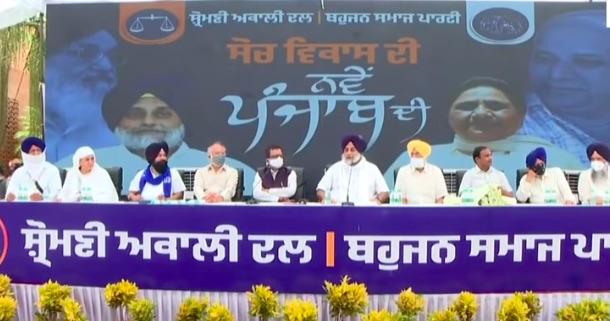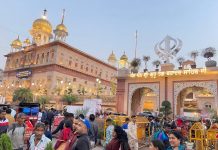
By Harjeshwar Pal Singh | OPINION |
The coalition between Shiromani Akali Dal (SAD) and Bahujan Samaj Party (BSP) announced on 12 June heralds the start of the grueling match for ascendency between the various forces for the crown of Punjab Politics in March 2022.
The alliance between Akali Dal and BSP after a lapse of 25 years unveils a new chapter in the political history of the state. SAD is a predominantly state level rural Jatt Sikh party. It has endeavoured since 1996 to become a Punjabi party and a champion of Hindu-Sikh unity through its alliance with the radical Hindu nationalist BJP. However last year it had to severe links with its junior partner in the state over the farmer laws .
It has embraced BSP, a Dalit party which has steadily lost ground nationally as well as in Punjab.
BACKGROUND: On Saturday (12 June 2021), SAD and BSP, which had jointly contested the 1996 Lok Sabha elections, announced an alliance for the 2022 Assembly elections in Punjab. The tie-up was announced at a press conference attended by SAD president Sukhbir Singh Badal and BSP General Secretary Satish Chandra Mishra. SAD patron Parkash Singh Badal later spoke to BSP chief Mayawati who has served four separate terms as Chief Minister of Uttar Pradesh.
BSP focuses on a platform of social change for Bahujans, more commonly known as Other Backward Castes, Scheduled Castes and Scheduled Tribes as well as converted minorities from these castes. The alliance eyes the large presence of Dalits in Punjab. Punjab’s Dalit population, making up close to 32%, is mainly concentrated in Jalandhar, Hoshiarpur, Nawanshahr and Kapurthala districts. The border state has the highest percentage of Scheduled Castes population in the country.
In 2017 state polls, BSP lost in all the 111 seats it contested.Since 1997, Akali Dal had joined forces with the Bharatiya Janta Party to contest the state polls, with BJP getting 23 seats.
This is how the senior Badal described the tie-up: “The alliance is a tribute to the composite vision of Guru Nanak Dev, Guru Ravidas and Bhagvan Balmiki and great saints and seers. That makes today the happiest day of my long political career as it marks the triumph of the concept of ‘Sarb Saanjhivalta’, ‘Sanman te Smajik Insaf’ (fraternity, equality and dignity) based on the ideal of ‘Sarbat da Bhala’ (welfare of all).”
Akali’s have a vote bank of about 25% and BSP 2-3%. Akalis are strong in Western Malwa, Rural Majha and rural Doaba while BSP is largely confined to the Doaba belt of the state.
The alliance has announced 20 seats for BSP in the state assembly elections for 2022. Akalis have left 9 seats in Doaba, 6 in Malwa and 5 in Majha to BSP. A preliminary glance at these seats reveals the following facts.
* BSP has been given the toughest seats for the alliance on which both parties have little chance of winning.
* Except 2-3 seats like Nawanshahr, Kartarpur and Phagwara, BSP will struggle.
* Many of the strongest BSP seats like Garhshankar, Banga, Balachaur, Phillaur, Adampur, Nakodar, Chabbewal, Sham Churasi, etc have been denied to it.
* Akalis by sacrificing 7-8 seats in Doaba stand a good chance in rest of rural Doaba and should be a formidable force in 16-17 seats .
* Akalis have also sacrificed some Hindu and urban seats like Pathankot, Bhoa, Sujanpur, Amritsar Central and Amritsar North in Majha ensuring that these seats will have direct Congress vs BJP contests.
* Akalis would be a force in 18-19 of Majha seats.
* Tacit Akali and BJP understanding seem to be in play as Akalis have given the toughest urban seats to BSP in urban Majha and Doaba where they have little chance.
* Aam Aadmi Party (AAP) should benefit by Akalis leaving seats like Payal, Chamkaur Sahib, Bassi Pathana and Mehal Kalan to BSP.
* Overall it seems Akalis by this move will hope to win 8-10 seats in both Doaba and Majha each.
* They also look good in Western and Southern Malwa.
* However as of today they look weak in Central and Eastern Malwa along with cities except in some pockets.
* Overall Akali Dal seems to be in the 35-40 range, as of today.
* Congress remains the most formidable opponent in all these 20 seats and it should hope to win a majority of these.
* AAP again looks down and out in Majha and Doaba.
 Harjeshwar Pal Singh is an assistant professor at Sri Guru Gobind Singh College, Chandigarh, where he teaches history. He is an avid political commentator.
Harjeshwar Pal Singh is an assistant professor at Sri Guru Gobind Singh College, Chandigarh, where he teaches history. He is an avid political commentator.
RELATED STORY:
Misogynistic treatment of women in farmers protest Asia Samachar, 5 April 2021)
Akali Dal revolt (Asia Samachar, 5 Jan 2020)
ASIA SAMACHAR is an online newspaper for Sikhs / Punjabis in Southeast Asia and beyond. Facebook | WhatsApp +6017-335-1399 | Email: editor@asiasamachar.com | Twitter | Instagram | Obituary announcements, click here |






























